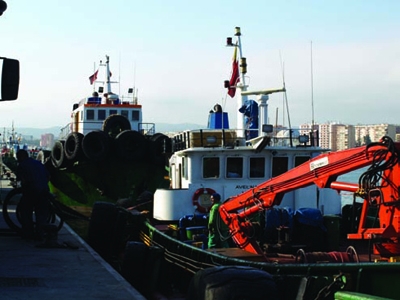IMO Diplomatic Conference
A diplomatic conference to consider a new agreement aimed at implementing the provisions of an international treaty on fishing vessel safety has adopted a new agreement on fishing vessel safety, to be known as the “Cape Town Agreement of 2012 on the Implementation of the Provisions of the 1993 Protocol relating to the Torremolinos International Convention for the Safety of Fishing Vessels, 1977”.
The conference, attended by 58 States, was held from 9 to 11 October in Cape Town, South Africa, under the auspices of the International Maritime Organization (IMO), the United Nations specialized agency with responsibility for maritime safety and security and the prevention of pollution from ships.
In ratifying the agreement, Parties agree to amendments to the provisions of the 1993 Protocol, so that they can come into force as soon as possible thereafter.
The Cape Town Agreement of 2012 will enter into force 12 months after the date on which not less than 22 States the aggregate number of whose fishing vessels of 24 m in length and over operating on the high seas is not less than 3,600 have expressed their consent to be bound by it.
The Agreement will be open for signature at IMO Headquarters from 11 February 2013 to 10 February 2014 and thereafter remain open for accession.
The safety of fishermen and fishing vessels forms an integral part of IMO’s mandate but the international instruments on fishing vessel safety which have previously been adopted by the Organization have not come into force due to a variety of technical and legal obstacles. Fishing at sea remains a hazardous occupation and the sector experiences a large number of fatalities every year. Bringing into force a binding international safety regime is expected to play a part in helping to improve safety standards and reduce the loss of life.
Amended provisions
The Cape Town Agreement of 2012 updates and amends a number of provisions of the Torremolinos Protocol, including the following:
Application
Unless expressly provided otherwise, the provisions apply to new vessels.
With regards to the implementation of certain provisions, Administrations may, in accordance with a plan, progressively implement the provisions of chapter IX (Radiocommunications) over a period of no more than 10 years; and the provisions of chapters VII (Life-saving appliances and arrangements), VIII (Emergency procedures, musters and drills) and X (Shipborne navigational equipment and arrangements) over a period of no more than five years.
Exemptions
The Cape Town Agreement of 2012 allows for Administrations to exempt any vessel entitled to fly its flag from any of the requirements of this annex if it considers that the application is unreasonable and impracticable in view of the type of vessel, the weather conditions and the absence of general navigational hazards, provided:
(a)the vessel complies with safety requirements which, in the opinion of that Administration, are adequate for the service for which it is intended and are such as to ensure the overall safety of the vessel and persons on board;
(b)the vessel is operating solely in:
(i) a common fishing zone established in adjoining marine areas under the jurisdiction of neighbouring States which have established that zone, in respect of vessels entitled to fly their flags, only to the extent and under the conditions that those States agree, in accordance with international law, to establish in this regard; or
(ii) the exclusive economic zone of the State of the flag it is entitled to fly, or, if that State has not established such a zone, in an area beyond and adjacent to the territorial sea of that State determined by that State in accordance with international law and extending not more than 200 nautical miles from the baselines from which the breadth of its territorial sea is measured; or
(iii) the exclusive economic zone, a marine area under the jurisdiction
of another State, or a common fishing zone, in accordance with an agreement between the States concerned in accordance with international law, only to the extent and under the conditions that those States agree to establish in this regard; and
(c)the Administration notifies the Secretary-General of the terms and conditions on which the exemption is granted under this paragraph.
Certificates
The International Fishing Vessel Safety Certificate is amended to state it is issued under the provisions of the Cape Town Agreement of 2012 on the Implementation of the Provisions of the Torremolinos Protocol of 1993 relating to the Torremolinos International Convention for the Safety of Fishing Vessels, 1977.
Resolutions adopted
The conference adopted the following resolutions:
Conference Resolution 1 Early implementation of the Agreement – urges States to become a Party to the Agreement as soon as possible to facilitate its early entry into force and cooperate with each other to achieve this end; and invites States to initiate action in accordance with the Agreement without awaiting its entry into force.
Conference Resolution 2 Avoidance of a situation in which two conflicting treaty regimes are operational – declares that, for purposes of introducing international regulations for the safety of fishing vessels, the Agreement replaces and supersedes the 1993 Torremolinos Protocol and therefore: States should not ratify or otherwise express their consent to be bound by the 1993 Torremolinos Protocol and should instead become a Party to the Agreement; and States which have already expressed their consent to be bound by the 1993 Torremolinos Protocol should take appropriate steps to signify their consent to be bound by the Agreement.
Conference Resolution 3 Promotion of technical co-operation and provision of technical assistance – urges States to provide, or arrange to provide, in cooperation with the Organization, assistance to those States which have difficulty in meeting the requirements of the Agreement and which request such assistance; and requests the Organization to intensify its efforts to provide States with the assistance they may need in implementing the Agreement and to make adequate provision for that purpose within its Integrated Technical Co operation Programme.
Conference Resolution 4 Preparation of a consolidated text – requests the Secretary-General of IMO to prepare a consolidated text based on: the Agreement; the Torremolinos Protocol of 1993 relating to the Torremolinos International Convention for the Safety of Fishing Vessels, 1977; and the Torremolinos International Convention for the Safety of Fishing Vessels,1977; in Arabic, Chinese, English, French, Russian and Spanish, for submission to the Maritime Safety Committee (MSC) for approval, and then distribute certified copies.
Conference Resolution 5 Procedure for calculating the number of fishing vessels of each Contracting State by the Depositary – requests the Maritime Safety Committee (MSC) to develop a procedure for calculating the number of fishing vessels of each Contracting State by the Depositary at the earliest opportunity, but not later than 1 January 2014.
Conference Resolution 6 Expression of appreciation to the host Government – expresses its profound gratitude and thanks to the Government and the people of the Republic of South Africa for their valuable contribution to the success of the Conference; and decides to designate the Agreement adopted by the Conference as the “Cape Town Agreement of 2012 on the Implementation of the Provisions of the 1993 Protocol relating to the Torremolinos International Convention for the Safety of Fishing Vessels, 1977”.

































































